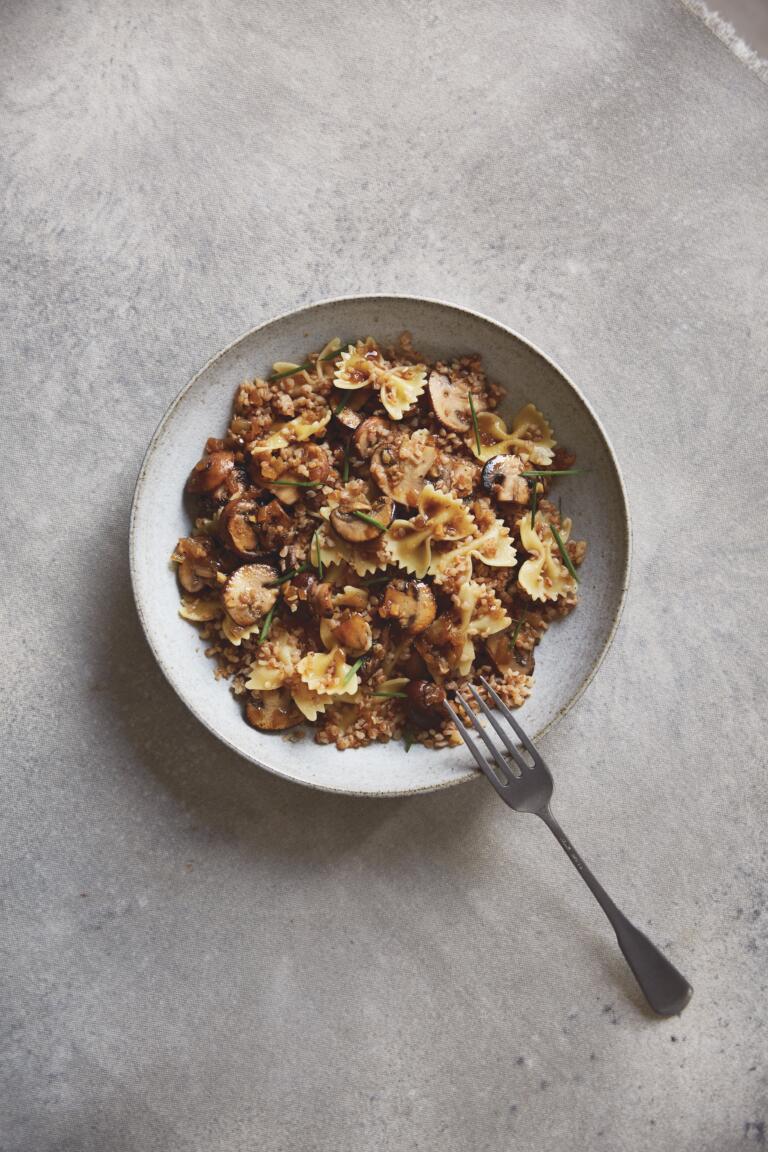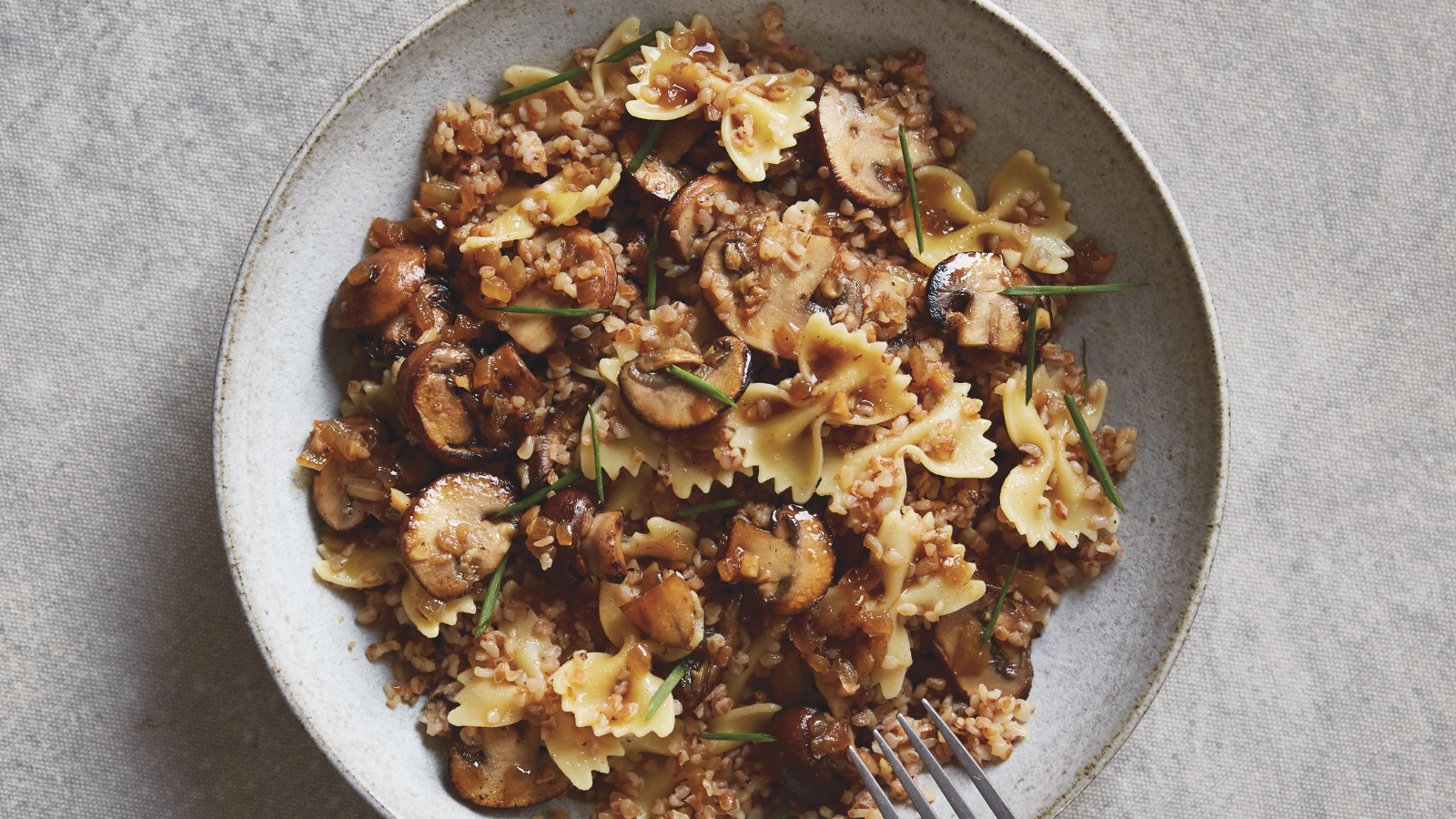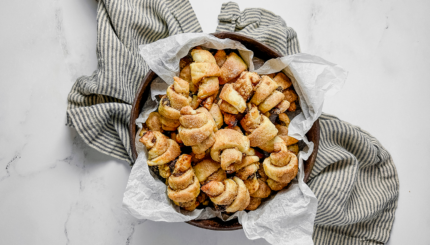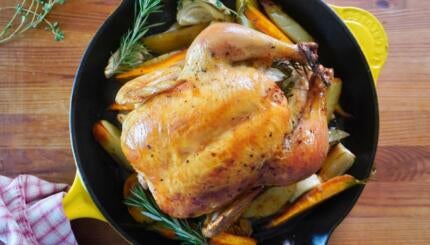In “Honey Cake & Latkes: Recipes from the Old World by the Auschwitz-Birkenau Survivors,” Tova Friedman writes, “My late husband’s favorite food was tzimmes, but he also shared his family’s recipe for kasha varnishkes. So from the time I had my own family and had children, we always used to prepare tzimmes and varnishkes. This is the “old-fashioned” way to make it: with lots of mushrooms.”
This hearty dish is perfect for the crisp fall months.
This recipe is reprinted with permission from “Honey Cake & Latkes: Recipes from the Old World by the Auschwitz-Birkenau Survivors.”

Kasha Varnishkes
This kasha varnishkes recipe is comforting and packed full of mushrooms.
- Total Time: 35-55 minutes
- Yield: Serves 4
Ingredients
- 4 cups of water
- 1 cup kasha (buckwheat groats)
- 1 extra-large egg, beaten
- salt
- 1 cup bowtie (farfalle) pasta
- 3 Tbsp butter or vegetable oil
- 1 large yellow onion, diced
- 12 ounces white mushrooms, sliced about ¼-inch thick
- 3 cloves garlic, minced
- ¼ cup soy sauce
Instructions
- Bring 4 cups of water to a boil and have it ready.
- Put the kasha in a medium bowl. Add the beaten egg to the dry kasha. Mix thoroughly so all the grains are uniformly coated.
- Heat a heavy-bottom 8-quart pot over medium-high heat until it is very hot. Add the kasha-egg mixture and stir continuously, breaking up clumps so that the kasha is very hot.
- Slowly pour the boiling water onto the hot kasha and add a pinch of salt. The kasha will explode and froth (this is the fun part).
- After all the water has been added and the pot settles down, skim any schmutz that might be floating on top. Reduce the heat to low, cover and cook until the water is absorbed, about 30 minutes.
- While the kasha is cooking, prepare the bowtie pasta according to package instructions (cook in salted water for about 12 minutes).
- While bowties are cooking, heat the butter (or oil) in a wide saucepan. Add the onion and cook until slightly softened, about 5 minutes.
- Add the mushrooms and then the garlic and cook until the mushrooms and onions are tender. Add the cooked kasha to the mushroom mixture, then add the soy sauce and toss gently to coat. Add the bowties just before serving. Serve hot.
- Prep Time: 5 minutes
- Cook Time: 30-50 minutes
- Category: Side Dish
- Method: Stovetop
- Cuisine: Ashkenazi
The Nosher celebrates the traditions and recipes that have brought Jews together for centuries. Donate today to keep The Nosher's stories and recipes accessible to all.




I love Kasha .Is it ok to not add the pasta ?
What is the easiest way to make this ? Can I add more mushrooms and onions ? I mean I know I can but how will it turn out ?
Hi! We love kasha too. I have only ever made this recipe with the pasta and kasha together. I might suggest looking up a kasha recipe to see if the ratios would differ by removing the pasta and adding more mushrooms and onions. If you make it this way, let us know how it turns out!
what can be substituted for the soy sauce if you are allergic?
You can leave it our, or try liquid aminos.
Worcestershire sauce would be a possible substitute for soy sauce.
I use Braggs Liquid Aminos.
I find it interesting that this recipe was almost lost in the Holocaust and it contains soy sauce. I had no idea they were using soy sauce at that time. I learn something new every day! Thanks for sharing. I make a really good kasha varnishkas but I will definitely try this recipe.
I am giving away some of the kasha. It doesn’t make sense to not just add the bow ties after it’s done. That’s the way I have done it before. Why is that a problem?
Carole, most of us do add the bowties after the kasha is done. Now that we can’t get the egg bows any more, we just use the regular pasta, farfalle aka bowties.
The smell alone transports me to my mother’s kitchen. Kasha is Jewish love!
There’s no reason why you can’t do it without the pasta. Maybe double the recipe, since most of the bulk is the bowtie pasta.
Exactly. When we got Mrs. Stahl’s kasha knishes (Coney Island), the kasha didn’t have any bowties in it. Just the kasha inside the knishes.
The recipe looks delicious. From a European point of view though, kasha and bowtie pasta are 100% American. I believe it comes from the confusion of a word “ferfel” a pasta roughly cut in tiny bits with a knife, and “farfalle”, borrowed to Italian fellow immigrants.
In my family/ community of French Jews, we use the word kasha varnishke for dumplings stuffed with kasha, and kasha et ferfel for a dish made out of schmaltz, onions, mushrooms, kasha and… well, ferfel 🙂 I wish I could add a picture. They are little square shaped pasta, dried and grilled before you cook them. The brand Rosinski sells them in France. Anyway, farfalle make for a cute sub
Thanks for the recipe. Interesting about the soy sauce. I’ll try it. I prefer baking the kasha with the bowties at the end. Nice crisp edges on bowties.
And who uses butter and not schmaltz???
This was a staple in the Jewish Deli’s in NY in the 60’s.
I often make Kasha into a side dish without the pasta. Sauteed mushrooms and onions make it a great accompaniment to any entree. Be sure to add enough salt, no need for soy sauce.
I think soy sauce is an American addition (and adds some interesting flavor). My Yiddishe Mama who was born in Poland did not use it. Otherwise, this recipe is similar to hers, and tastes delicious!
Love Kasha varnekes. To the question…can you just make the kasha and not the bowties? Of course….but then you just have kasha! It would be the same as if you took a recipe for meatballs and spaghetti, and asked if you could not put in the spaghetti! Of course…..but then you just have meatballs.
now I see why my mother’s kasha varniskes was always so dry and tasteless!
I’m vegan and don’t eat eggs. What can be substituted to replace the egg and still comes out good?
You can actually leave the egg out.
Can this be made using barley?
Instead of using water and soy sauce use chicken Broth. Just fabulous. My mom’s recipe.
My husband makes this, and he uses chicken broth, too. We also double the mushrooms and use at least three large onions. It’s great!
There is a brand of “ varnishkas” that is not pasta. They are small egg noodle now ties, if you can find it. There are also small pasta bow ties that aren’t nearly as heavy as the farfalle.
That is what I use if I can’t find the small egg noodle bow ties. I never heard of adding soy sauce to a kasha varnishkas recipe and I also don’t believe this was the recipe from the Holocaust; they didn’t have soy sauce!
I agree. My grandmother came from Russia well before WWII and made this exact recipe without soy sauce. She would not have been familiar with soy sauce.
I just made a big pan of kasha varnishkes and my son walked in just as I finished and said he would like to taste it. He said it took him back to a time when his grandmother used to make it. There are just the two of us so I freeze most of what I make in portion sized containers and my husband and I enjoy this for several meals. I do not use soy sauce but if I have left over gravy that goes in with the chicken broth that I use instead of water.
I don’t bother with the egg mixed with the kasha. I saute the vegetables in butter then add the kasha and mix it well into the vegetables. Also, I use chicken stock. I’ll try adding the soy next time I make. My husband would put me out of the house if I didn’t serve with bowties. I believe there is a law!
I used Worcestershire sauce as a sub for the soy sauce. Worked great!
My kasha varnishkers the best .. I fry 2 lbs onions almost burn to crisp add loads of flavor to kasha .. everybody loved them. .. no no soy sauce
I used to add the egg and bake in the oven until egg was absorbed but I usually leave this out. I think it was done when people were really poor to add a little protein. You can make onions way before and freeze. My onions are always very nicely browned. (Takes awhile, that is why I do it in advance.) You can’t have too many! If I add mushrooms, they are sauteed, but nowhere near as long as the onions. I use both canned and fresh. No garlic, for sure NO soy sauce, just salt and black pepper. Bowties are optional. I prefer smaller ones when I do add, but not always available. I cook separately and add when heating up. Again, to me, they are filler. Kasha is the star! This was my grandmother Ethel’s recipe. She was an amazing balabuster.
Cook whole groats in chicken stock for added flavor. After 12 minutes shut the flame but keep the lid on for another 20 minutes. Fluff with a fork. Leftover kasha is wonderful for breakfast with two easy over eggs with or without the pasta. Also kasha is the perfect accompaniment to brisket.
Soy sauce?!? Sounds like the recipe was updated.
I make kasha varnishkes every other week for shabbos..in between I make tzimmas. My hubby makes the grieven and schmaltz….great in the kasha!!
Alternating weeks we have appetizers of (ulipjes sp? ) aka stuffed cabbage, liver and onions, or chicken fricasee.
I LOVE Friday nights….and the memories they rally!!
Your menu of food reminds me of wonderful memories of my mom. Thank you. Joan
I have always used the bow tie pasta with the kasha.. Instead of butter or oil, my mom made it with chicken fat for more flavor.
this is my recipe developed over many years:
–I cook about 1/2 a large package of bow tie pasta
and put the noodles in a bowl
–I beat 2 eggs and add 2 cups of kasha and coat them with the eggs
–In the pot I used to cook the bowties, I either fill it with water or
chicken broth, about 3-4 cups
–I dice a large onion and add it to the pot of water or broth
–I slice brown mushrooms and add them to the pot
–I add two good chunks of butter to the pot and cook it all on medium heat,
when it boils I lower it
–I heat a skillet and add the kasha/egg mixture and move it around until all
the egg on the kasha is dry
–I pour the water/broth mixture over the kasha
–sometimes I also add beef stew chunks
–Himalayan salt or kosher salt and pepper to taste
–all the ingredients are organic btw
–I always make something to last a few days
–I’ve never added soy sauce
–make sure there is enough butter it makes a big difference
Instead of cooking the kasha in water, I use chicken soup.
Wilma, you can use ANY liquid you like. The recipe calls for water, but soup/stock/bouillon will add flavor
You don’t need the egg. Toast the kasha in a medium hot pan, stirring, then when it’s hot, add liquid (water or broth) a little at a time, stirring, until the kasha no longer absorbs water. The noodles should be cooked. The onions should be cooked until golden brown. At least that was my family’s recipe and it’s good.
You can also cook kasha, add browned onions and mushrooms and butter and bake in a covered baking pan. It’s a old Russian recipe.
For those who don’t use the egg: Its purpose is to preserve the integrity of the kasha. Otherwise, it can turn to mush.
Just for us all … did some research about soy sauce in Europe and it’s timeline. It was actually probably still called something else (possibly shoyu?) and was first mentioned in the late 1500s in Europe. It may be called soy sauce now, but it is VERY plausible as part of someone’s recipe in World War II Europe. If you want references, please ask, or google it for yourself. Just because it was not in other people’s family recipes does Not invalidate it here. Just saying …
I love history of food. Thanks for checking this out. Shalom
My mother was a Holocaust survivor who grew up in Slovakia. She told me she had never eaten kasha until her family was deported to Poland in the early 1940’s. Yet we grew up eating it in the States as if she had grown up with it. I continued the tradition with my own children who grew up in Israel!
My way to minimize the pasta but still include it is to use farfalline.
My father used beef bouillon (or beef stock) for the kasha water. I usually use chicken stock. Soy sauce just doesn’t seem right.
My husband and I love kasha, so we were delighted to find so many recipes here for using it. I see that some people need to avoid eggs, so perhaps this may help. Recently, we bought some online at Amazon, under the name Koktem Buckwheat, which is pre-roasted. This is the first kasha I have bought that did not turn to mush when boiled (with no egg coating). I boil 2 cups of kasha at a time and freeze half for later use, using the rest immediately in some dish with other ingredients. The grains of buckwheat keep their shape beautifully, right up to when they are served. Today, before finding this site, we ate them with various chopped and fried vegetables: onion, celery, and very long, thin string beans from an Asian food market, along with a handful of pine nuts. Didn’t happen to have any mushrooms available, though I agree with others that they go great with kasha.
I am looking forward to trying the delicious- looking recipes here!
Having just sung the praises of Koktem Roasted Buckwheat Groats, I returned to Amazon just to make sure that I hadn’t mistaken the place where I bought them. I regret to say that–although it WAS Amazon-on Amazon and elsewhere, they appear to be unavailable right now. Sorry to have mislead anyone in my first comment.
I am hoping that the company has not stopped producing the groats and the problem is merely that they have sold all of last year’s crop, in which case, there is hope to be able to buy more some time next year. As it happens, I had chosen a sort of bundle order of three bags, so I will be able to continue making these recipes for some time.
Until Koktem’s product comes back online, or if it never does, does anyone else here know of a brand of buckwheat groats that doesn’t become mushy? I’d like to be able to skip the egg-coating step.
Manaschevitz (sp) has kasha (buckwheat groats) in different grinds ,coarse, medium, etc.
Usually the ratio of Wolfs Kasha to liquid is 1:2 – is the 1:4 ratio intentional here? (I also notice that the method is different because you boil the water before adding, so maybe that’s relevant).
Hi Ari, yes, the 1:4 ratio is intentional. Enjoy!
I love the Kasha recipe however I am not permitted to have any Soy products. Is there a another substitute for this delicious dish ?
That’s the way I do it. Love kasha but nope, no bow ties
We added the beaten egg to dry Kasha in a large fry pan and mixed it until all Kasha was as coated. Never heard of adding soy sauce before, but sounds interesting.
Love Kasha. I make mine like above without mushrooms. I often make a Kasha Pie with masked potatoes onions and Kasha. I mix altogether and bake in top and bottom pie crust it’s delicious
I’ve been making kasha for decades and never use the pasta. I use schmaltz, which can be bought frozen in some stores (Gelson in CA). I use hot chicken broth, and lots of sliced mushrooms and onions, sautéed separately in a pan with schmaltz. That’s the way my immigrant mother made it. It’s delicious. As for soy sauce, that’s gotta be a joke. Who in the shtetel would know about that.
ca
this is VERY SIMILAR to the way I make it:)…But NO soy sauce in mine…It is a family fsvorite & expected to be served @ EVERY family gathering ( with the EXCEPTION of PESACH)
I would never use butter, that is dairy, where I live I can’t get enough chicken skins to make schmaltz. So I use the vegetable oil that I’ve fried the onions in, and no one has complained that I use oil.
I’m having an issue. How can this be an authentic recipe almost lost in the Holocaust using “Soy Sauce?” Doesn’t make sense-sorry
I’ve never heard of using soy sauce in this recipe
Great recipe. For the oven method what is included, and what is excluded from “the kasha” that goes into the casserole. The recipe is a bit unclear on this important point.
I wasn’t a big fan as a kid but I recall how much my Dad loved it when my Mom would make it. Bought me some kasha, got the bowties, and look forward to my first varnishkerie!
sounds delish. I will make it soon. I like adding mushrooms, onions and garlic
I see I’m not the only one to question the ratio of water. On checking other recipes, I note none of them suggest using so much. In fact, on making it today, I found that there was way too much water. Otherwise, a lovely taste from my youth.